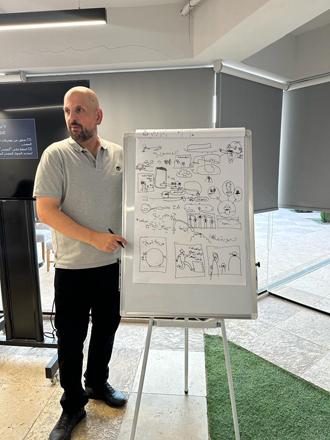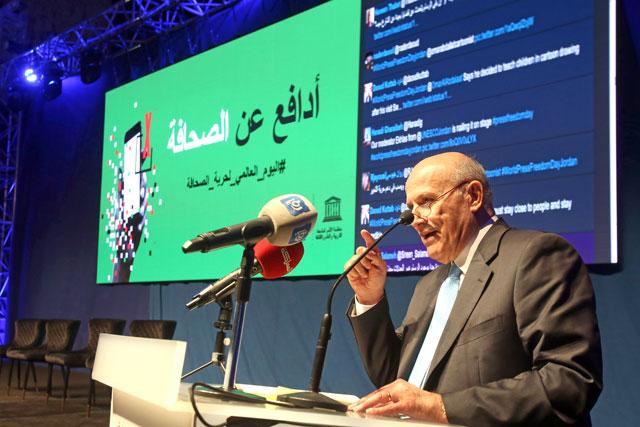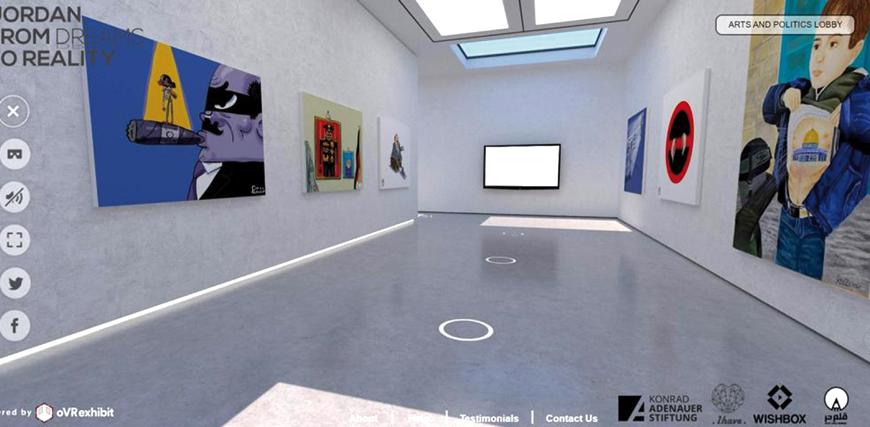You are here
UNESCO Jordan organises workshop on cartooning in bid to counter hate speech
By JT - Jun 25,2023 - Last updated at Jun 25,2023

Cartoonist Omar Abdallat during a workshop on countering hate speech in Amman (Photo courtesy of UNESCO)
AMMAN — Recognising the urgent need to counter hate speech, UNESCO organised a three-day workshop in Amman, led by the cartoonist Omar Abdallat.
A group of 10 journalists and visual artists united to harness the power of editorial cartooning, exploring innovative ways to promote diversity and combat hate speech, according to a statement from UNESCO.
Hate speech fuels fear and division, with far-reaching consequences for democracy and social cohesion. In a world where freedom of expression is threatened, cartoons have emerged as a powerful tool to expose injustice, highlight important topics, and ignite empathy and understanding. As prominent cartoonist Omar Abdallat puts it: "Cartooning has the ability to challenge social issues, spark conversations, and inspire change”, read the statement.
The workshop provided an opportunity for these professionals to enhance their skills, expand their portfolios, and enrich the quality of journalism by integrating drawings into their written articles.
Afnan Abu Yahya, a digital journalist, highlighted: "Participants gained insight into the history of caricature, expanding their perspectives and strengthening their visual thinking abilities. This knowledge proved valuable for multimedia reports and addressing political, social, and economic issues.”
Shurooq Al Nsour, an investigative journalist, discussed the integration of editorial cartooning in investigative and data-driven journalism.
Shurooq said: "The workshop explored how caricature can enhance the delivery of targeted content, amplifying visual engagement in journalistic material."
Shurooq stressed the valuable role of editorial cartoons in enriching investigative journalism with visual storytelling, simplifying complex issues, and conveying impactful stories sensitively.
By selecting resonant symbols, caricatures can effectively communicate messages that influence government directions and decisions. Issam Abbadi, a content writer and editor, initially struggled with painting but discovered the power of expression through drawing and symbolism.
Issam explained: “Although I didn't emerge as a master painter from the workshop, I gained valuable insights on interpreting ideas and employing visual representation to convey the intended messages.”
Ikhlas Al Khawaldeh, UNESCO Programme Specialist, said: “This initiative has strengthened the participants’ resilience to hate speech, extremist narratives, and conspiracy theories”.
“In an era where freedom of expression face numerous challenges, caricature remains a powerful force. Through their bold strokes and insightful symbols, cartoonists wield their pens as instruments of change, reminding decision-makers of their responsibilities and inspiring them to reconsider their positions,” she added.
Ibrahim Tonnerieux, a workshop participant, and a visual artist said: "The workshop equipped me with practical knowledge to enhance my drawing skills and effectively convey complex ideas using simplicity and humour. It also deepened my understanding of hate speech and its impact on communities, while providing new avenues for artistic expression."
As a street artist, Ibrahim added: "I plan to utilise this newfound knowledge to create compelling murals that raise awareness about hate speech and its detrimental effects on society”.
This workshop activities were supported by UNESCO's Multi-Donor Programme for Freedom of Expression and Safety of Journalists (MDP).
Related Articles
AMMAN — The Jordan Press Foundation (JPF) — Al Rai on Wednesday hosted the UNESCO celebration of the World Press Freedom Day (WPFD) 2019, on
AMMAN — Some 100 youth and partners on Sunday gathered at the King Hussein Club, to share their personal experiences in the field of media a
AMMAN — A virtual art exhibition, titled “Jordan from Dreams to Reality”, was launched on Sunday evening, showcasing more than 30 artworks b

















